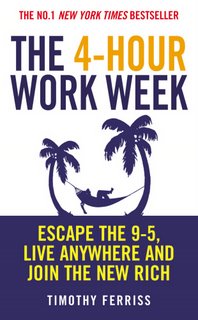Business/Self development books bring to mind sheep in wolfs clothing; they’re a better fit with ‘auto-biography’ than the ‘fix it’ genre.
What they represent is life experience pulled together, bowerbird style, into a personal ethic, philosophy, research paper, manual, etc.
The unifying theme is: ‘buy my book/ebook; CD/DVD; workshop/seminar, and, I’ll show you how you too can get: rich/religion; motivated/thin; up early/up yourself; calm/connected; jailed/free; colour coded/colour integrated; multiple orgasms/organised; the perfect job/the bosses job; wired/unwired; a 3rd mortgage/a 3rd bankruptcy; a dodgy song into Eurovision/a colonic irrigation @ FutureLifeVision; a cubicle on the window side (when Roger retires)/a $50 million hand-shake (only a few of these)… Get it?
They are published, for better or for worse, because the author wants us to feel as good as he does when we replicate his life, buy (sic) following his process/rituals/acronyms/advice.
At first reading, The 4-Hour Work Week fits this genre: work less/play more; increase income/decrease hours; more freedom/less accountability. Yeah, yeah…
Move on, you’ve read it all before; you know the drill! But wait! This time it may be different.
Sure, Tim Ferriss walks his talk (lots do), tells it like it is (very Gen Y), has zero tolerance for ‘idiots’ (envy it), and yet, on second (and third) reading, there is more, much more here.
It’s rests in what Tim Ferriss doesn’t say.
It’s what he, and a few others of his generation, (unwittingly) demonstrate in who/how they connect, commit, commune and communicate with their species; in the way they engage life.
What Book Rapper is flagging is perhaps something that you don’t yet know you will want to know.
The way we see it is that the global perception and practice of work has undergone a seismic shift.
We’re in the beginning of an ‘Industrial’ Revolution (we’ve had several of them; a major one was the 40 hour work week) and the 4-Hour Workweek concept makes the Short Time Movement look like an all day sucker!
The Short Time ‘8 Hour Day’ movement grew out of the atrocious conditions of England’s Industrial Revolution’s factories. With working days of 12-16 hours commonplace Robert Owen launched a plan for an 8 hour day way back in 1817.
His innovative vision was for a 24-hour-day plan comprising 8 hours of work, 8 hours of play and 8 hours rest.
Whilst skilled workers in Australia and new Zealand were awarded a union negotiated 8 hour day as early as the 1850’s it didn’t become a typical day for all workers until around 1920.
One hundred and fifty years later, the end of the 9-5, M-F 40 hours work/live for the weekend lifestyle is rolling into a workplace near you...
Like Owen, TIM Ferris has posted a radical vision – a 4-Hour Work Week – and it’s close to the mark of the promised ideal offered at the beginning of the Information/Knowledge Age.
Remember the Age of Leisure (freedom) with which visionaries of the recent past have tantalised and motivated us? Well, Ferriss shows us that he has achieved it; he’s pulled the plug on an 80 hour, office bound week and freed himself to live his ideal lifestyle.
His DEAL offers each game soul the key to enable them to pursue a personal dream or passion. You can create a one-off blueprint, a personalised Lifestyle Design and live your ideal life.
The DEAL process is also the perfect lense through which to view changes in industrial, social and cultural evolution over the last 200 years.
In terms of Time, if you’re still working 50-70 (or more) hours a week, then you’re doing no better than steam driven England. It may be that your soul (sic) purpose in life is to serve as a warning to others!
When Absolute Income (hours in/dollars out) is the measure, we’re all better off. However, the outstanding winners today are those who plan around, and insist on, Relative Income ($$$’s per hour worked).
Finally, if you’re commuting to a cubicle five or six days a week then you’ve only traded tools and method in the Mobility stakes since 1850; you’ve effectively swapped your loom for a computer, and your horse for an engine.
Tim Ferriss insists that you define what ‘work’ is for you. Why are you doing what you’re doing? He claims that it can only be one of two things: ‘income generation’ or ‘dream fulfilment’.
‘Work’ is a scientific term; it’s a measure of energy used. It has nothing to do with generating an income or fulfilling a dream.
Will you choose to generate an income or pursue your passion and live your dream? What might happen if you re-frame the word ‘work’ to ‘income’ or ‘dream’?
Be mindful that even when you don’t choose, you do! Life is the original DIY: Lifestyle Design is your own personal ‘how to’ map.
Why should you change?
- Family : What did you miss out on growing up? Are you leaving the same legacy for your family or pumping for something different?
- Career : Is the cost of what you’re pursuing worth it? Are you in a game worth playing; a game worth winning? Are you going through the motions or training yourself for a better tomorrow?
- Self-Image : Are you holding onto habitual beliefs that keep you from pursuing opportunities to show what you secretly believe you’re really made of?
Listen, really listen, to your internal voice, your instincts, your intuition. You can’t store time in a bottle. Drink deeply today, down to the last sip. Don’t waste a drop.
The 4-Hour Work Week could JOLT you to make a paradigm shift in how you relate to yourself and to your world.
It’s about being you first, in designing yourself as a person, who you are and only then about what you do to earn the income you need to practice, act as, behave, experience being who you are.
It’s an inspiring book when read as that – an account of how one person lives an inspirational life. Tim clearly set out his process and it is a repeatable one.
Otherwise, you know all the stuff in it. It’s the little brother of 1984 and the 80/20 rule. Great principles that we all need reminding of now and then – eliminate crap: work on what brings in 80% of your income.
You know all that. And frustratingly, you don’t follow it.
Why? Could it be that you’re not being your true self. Are you acting out of what you have to do – what is expected – and not what you want to do.
Are you being YOU?
Update
With this book now a couple of years old, it’s interesting to notice how it’s message is filtering through the community. In particular, I’ve had a series of conversations with people changing their goals since reading The Four Hour Work Week.
For instance:
- Colleagues rethinking their careers. In particular, restructuring their work activities and starting new businesses to focus on cash flow rather than being satisfied with 9-5 attendance.
- A lot more talk about mini-retirements and a host of people taking them. I’m heading to Sydney for 4 week working holiday in a couple of days. I’ll be meeting with clients on half my days, writing Book Rapper on the others and enjoying the fresh Sydney air on the weekends.
- Finally, a few rumblings in the world of HR favouring flexible work conditions. Some I’ve spoken to backed off from their plans to ask for flexible work due to the threat of cutbacks in the wake of the Global Financial Crisis. Others, spotted the opportunities and were able to negotiate a 4 day work week to work on other things – less work and more mobility. In return the employer was able to cut salaries by 20%. A good win-win. Others I spoke to abandoned the permanent job for a contract position – work 9 months for the same pay!
Love to hear how you, or people you know have taken on board the principles of Tim Ferris’ The Four Hour Work Week.
If you haven’t read the book do so. Alternatively, read our RAP, ‘The Four Hour JOLT!’ It’s now available on our website for free.




